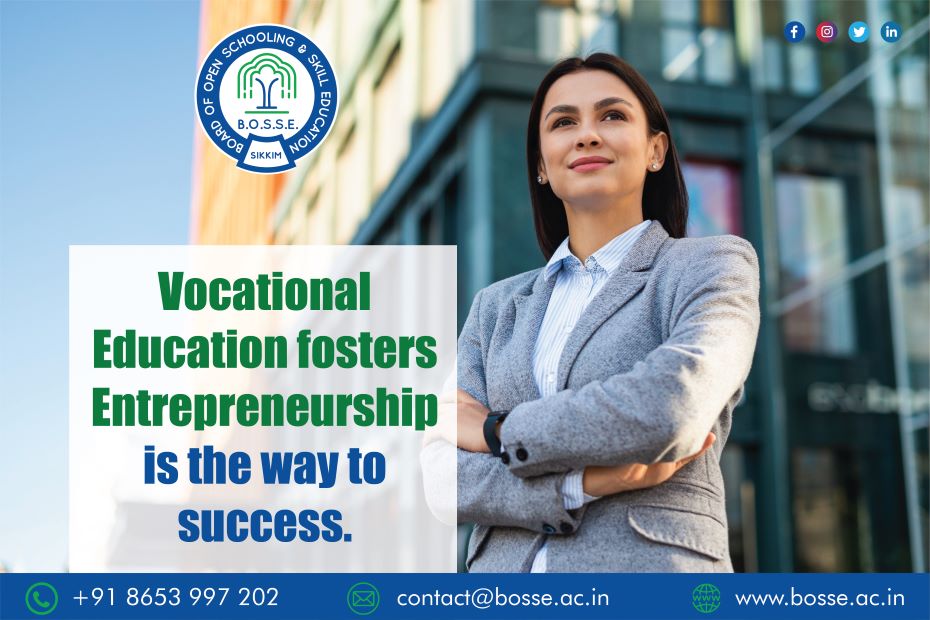Vocational Education plays a vital role in shaping the future of Education system in India. The (BOSSE) Board of Open Schooling and Skill Education Sikkim is an open schooling system and an autonomous organization that provides open and distance learning opportunities to a diverse range of learners, including those interested in vocational education and skill education. Vocational Courses offers a variety of vocational courses that cater to the needs of learners who are looking to acquire specific skills for employment or entrepreneurship. These courses cover various sectors such as agriculture, automotive, construction, healthcare, information technology, tourism, and more. Flexibility and Accessibility is provided in terms of admission, examination, and course completion. Learners can pursue vocational courses through open and distance learning, allowing them to study at their own pace and convenience. This flexibility makes vocational education accessible to a wide range of learners, including school dropouts, working professionals, and individuals from marginalized communities. Recognition and Certification in vocational courses are designed to meet industry standards and requirements. Upon successful completion of a vocational course, learners are awarded. These certificates are valued by employers and are considered valid for employment purposes. Curriculum Development and course material is encouraged in collaboration with industry experts, employers, and vocational training providers to design and update the curriculum to ensure its relevance to the current industry needs and emerging trends. Skill Education Initiatives are encouraged in partnership with various stakeholders. It partners with government agencies, industry bodies, vocational training institutes, and skill development organizations to promote vocational education and enhance the quality of skill training programs.
Research and Innovation is allowed for assessment and to evaluate the effectiveness of vocational programs and identify areas for improvement. It also explores innovative teaching and learning methodologies to enhance the learning experience and outcomes for vocational learners.
Vocational education in India refers to a form of education that focuses on developing practical skills and knowledge required for specific trades, industries, or professions. It is aimed at equipping individuals with the skills necessary to enter the workforce and pursue careers in various vocational fields.
Salient Features of Vocational Education in India:
- Objectives: The primary objective of vocational education in India is to provide individuals with the skills and knowledge needed for gainful employment. It aims to bridge the gap between formal education and industry requirements, promoting employability and entrepreneurship.
- Vocational Training Providers: Vocational education in India is offered by various institutions, including Industrial Training Institutes (ITIs), Polytechnic Institutes, Vocational Training Centers (VTCs), and skill development organizations. These institutions provide training in a wide range of sectors, such as engineering, information technology, hospitality, healthcare, automotive, construction, and more.
- Courses and Certification: Vocational courses in India vary in duration and levels of certification. They can range from short-term courses and certificate programs to diploma and advanced diploma courses. Some vocational courses are also integrated into the formal education system at the secondary and higher secondary levels.
- Industry Collaboration: To ensure that vocational education aligns with industry requirements, there is an emphasis on collaboration between educational institutions and industry partners. Industry experts are involved in curriculum development, providing practical training facilities, and offering internship and apprenticeship opportunities for students.
- Government Initiatives and Funding: The Indian government has taken several initiatives to promote vocational education, such as setting up Sector Skill Councils (SSCs) to develop industry-specific skill standards and qualification frameworks. Financial support is provided through various schemes and programs to facilitate skill development and vocational training.
- Challenges and Future Outlook: While vocational education in India has made significant progress, there are still challenges to address, including the need for quality infrastructure, skilled trainers, industry collaboration, and a change in societal perception towards vocational careers. Efforts are being made to integrate vocational education into mainstream education and create a robust ecosystem for skill development.
Overall, vocational education in India plays a crucial role in addressing the skill gap and increasing employability. It provides individuals with practical skills and knowledge to pursue careers in various sectors, contributing to the economic growth and development of the country.
The role of institute in vocational education is crucial in providing flexible, accessible, and industry-relevant skill development opportunities to a diverse group of learners. It helps bridge the gap between formal education and vocational training, enabling individuals to acquire the necessary skills for employment, self-employment, and career advancement.
